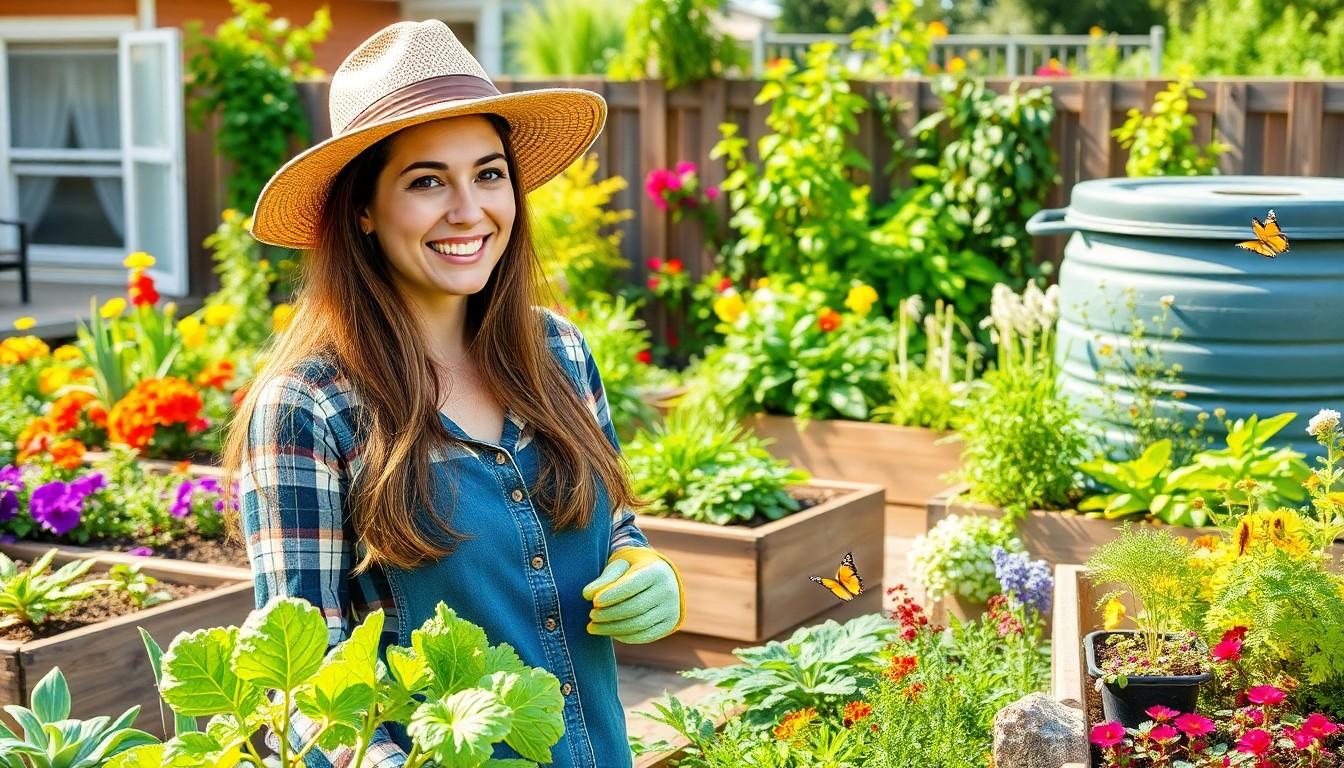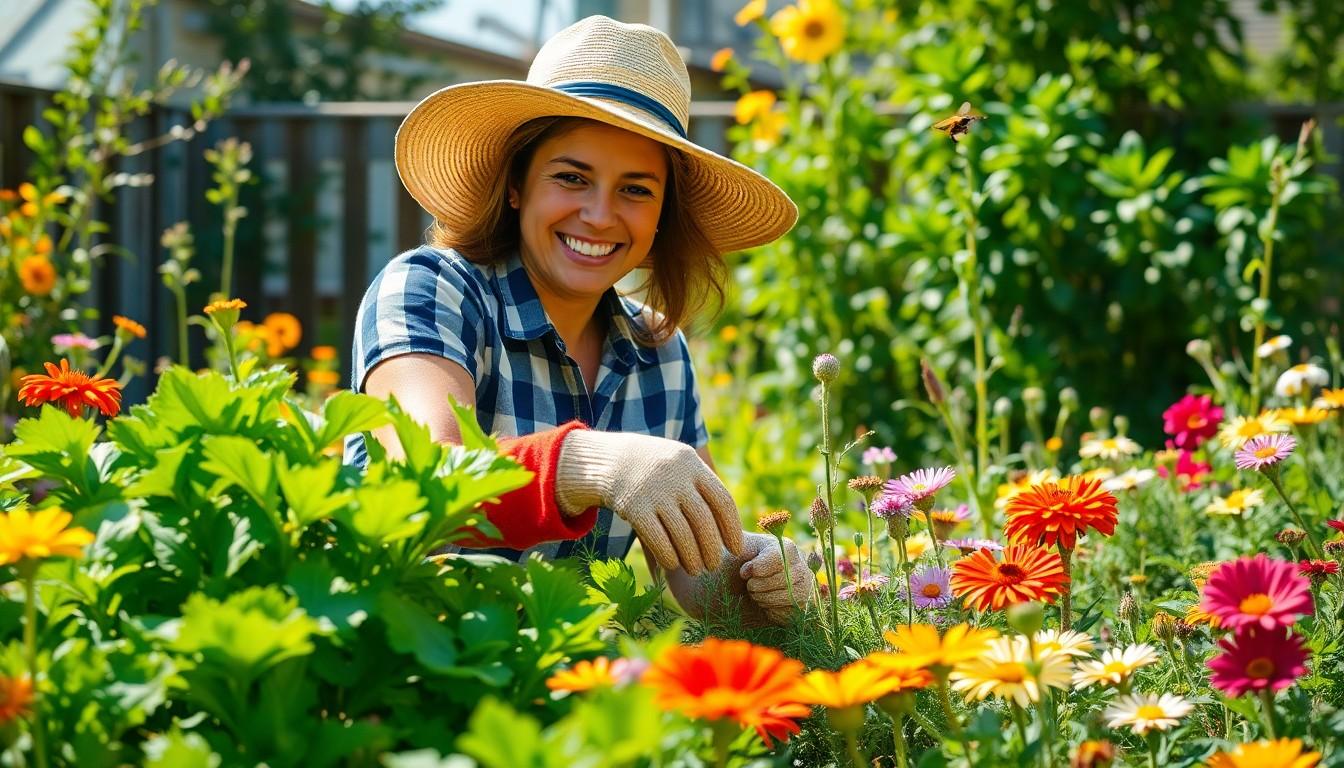Phone:
(701)814-6992
Physical address:
6296 Donnelly Plaza
Ratkeville, Bahamas.

Imagine stepping into your backyard and being greeted by a vibrant oasis of fresh veggies and fragrant herbs, all while saving the planet. Sustainable backyard gardening isn’t just a trend; it’s a lifestyle choice that can turn even the tiniest patch of dirt into a green powerhouse. With a little creativity and a sprinkle of humor, anyone can transform their outdoor space into a thriving ecosystem.
Sustainable backyard gardening focuses on environmentally friendly methods to cultivate plants. This practice promotes biodiversity, reducing waste, and minimizing water use. Individuals can design their gardens to function as ecosystems. Native plants attract beneficial insects, while companion planting can enhance growth and deter pests.
Soil health becomes a priority in sustainable gardening. Techniques like composting enrich soil with nutrients, supporting vibrant plant growth. Organic fertilizers provide additional benefits without harmful chemicals. Maintaining healthy soil leads to healthier plants, which are more resilient against diseases.
Water conservation remains crucial in this approach. Implementing rainwater harvesting systems can alleviate the strain on local water resources. Mulching helps reduce evaporation and maintain soil moisture. Collecting water runoff during storms benefits gardens while protecting the environment.
Pest management strategies also change in sustainable gardens. Integrated Pest Management (IPM) incorporates natural predators, reducing the need for chemical pesticides. Monitoring plant health and recognizing signs of trouble can ensure timely intervention without harming beneficial organisms.
Community involvement strengthens sustainable gardening efforts. Sharing knowledge through gardening workshops fosters a sense of connection. Engaging with local gardening groups promotes resource sharing, creating a supportive network. These interactions enhance the gardening experience, making it more enjoyable and productive.
Sustainable backyard gardening combines ecological practices with personal gardening goals. Adopting this approach allows individuals to create beautiful spaces while supporting the environment.

Sustainable backyard gardening offers numerous advantages that contribute to both personal well-being and the environment.
Environmental benefits are significant. Sustainable practices enhance biodiversity as native plants attract beneficial insects. Reducing chemical pesticide usage promotes healthier ecosystems. Composting and using organic fertilizers improve soil health, leading to a thriving garden. Water conservation strategies, such as rainwater harvesting, minimize resource waste. Additionally, creating habitats for wildlife encourages ecological balance. Gardeners can also find joy in observing local fauna, such as pollinators. Overall, these methods support a healthier planet.
Health improvements arise from sustainable gardening. Access to fresh vegetables and herbs boosts nutrition levels. Engaging in gardening activities provides physical exercise, promoting an active lifestyle. Mental well-being enhances through outdoor engagement and stress relief. Connecting with nature fosters a sense of community, reducing feelings of isolation. People who participate in gardening often experience increased mindfulness. Sustainable practices in gardening contribute to a healthier lifestyle overall.
Sustainable backyard gardening thrives on intentional practices that enhance the environment. Prioritizing methods that nurture and protect plant life creates impactful results.
Soil health forms the foundation of productive gardens. Composting serves as a vital practice, enriching soil with nutrients while reducing waste. Organic materials like kitchen scraps and yard debris decompose to create a rich, dark compost. Regularly adding compost improves soil structure and promotes beneficial microbial activity. Amending soil with natural fertilizers enhances fertility and encourages robust plant growth. Testing soil periodically informs any necessary adjustments, ensuring optimal pH and nutrient levels for planting.
Effective water conservation techniques minimize waste while sustaining plant health. Methods like rainwater harvesting capture and store precipitation for later use. Utilizing drip irrigation systems delivers water directly to plant roots, reducing evaporation loss. Mulching serves to retain soil moisture and suppress weeds, supporting healthy growth. Designing gardens with native plants requires less water and fosters local biodiversity. Grouping plants with similar water needs further maximizes efficiency and reduces overall consumption.
Utilizing organic pest management strategies protects plants without harmful chemicals. Implementing Integrated Pest Management (IPM) encourages a balanced and sustainable approach to pests. Introducing beneficial insects like ladybugs naturally controls aphid populations. Companion planting also promotes pest deterrence, with certain plants repelling or attracting specific insects. Regular monitoring helps identify pest problems early and addresses them with eco-friendly solutions. Organic methods support biodiversity and promote a healthy garden ecosystem.
Designing a sustainable garden involves strategic choices in plant selection and ecosystem creation. This approach fosters environmental benefits and cultivates a thriving space.
Selecting native plants serves as a foundation for a sustainable garden. Native species thrive in local climates and soils, requiring less maintenance and water compared to non-native alternatives. These plants attract beneficial insects, such as pollinators and natural pest controllers. Incorporating a variety of native plants enhances habitat diversity and improves overall garden resilience. For example, planting coneflowers and black-eyed Susans can draw butterflies while providing color. Additionally, utilizing local flora reduces reliance on chemical fertilizers and pesticides, boosting soil health.
Creating a biodiverse ecosystem supports sustainable practices. This diversity attracts a wide range of wildlife, enhancing the natural balance in the garden. Interplanting flowers, shrubs, and trees can foster habitats for beneficial creatures. Integrating companion plants improves growth and deters pests without chemicals. For instance, layering heights in plant selection can create shelter for various species. Incorporating features such as birdhouses and bee hotels further encourages wildlife. A rich array of plants and habitats nurtures insects, birds, and other creatures, ultimately leading to healthier plants and a thriving garden.
Effective gardening relies on the right tools and resources. Using quality instruments and engaging with informative networks enhances the sustainable gardening experience.
Essential tools include hand trowels, pruners, and garden forks. These instruments facilitate soil preparation and plant maintenance. Compost bins contribute significantly to nutrient recycling, while rain barrels collect and conserve water. Raised garden beds promote better drainage and elevated soil temperature, encouraging plant growth. Mulching materials help retain moisture and suppress weed growth effectively. Each of these tools supports sustainable practices and contributes to overall garden health.
Numerous online resources offer actionable advice and community support. Websites like the National Gardening Association provide expert tips and sustainable gardening techniques. Social media platforms host dynamic groups where gardeners share experiences and strategies. Community forums offer a platform for discussing local gardening challenges and successes. Blogs dedicated to sustainable practices can inspire creativity and offer specific guidance for various gardening scenarios. Engaging with these resources fosters knowledge and connectivity among gardening enthusiasts.
Sustainable backyard gardening offers a rewarding way to connect with nature while making a positive impact on the environment. By embracing eco-friendly practices individuals can cultivate a flourishing garden that supports biodiversity and promotes healthy ecosystems.
The journey into sustainable gardening not only provides fresh produce but also fosters a sense of community and well-being. As gardeners implement techniques like composting and water conservation they contribute to a more resilient planet.
Each small effort in the garden can lead to significant environmental benefits. With creativity and commitment every backyard can become a sanctuary for both plants and wildlife. This lifestyle choice not only enriches lives but also nurtures the earth for future generations.